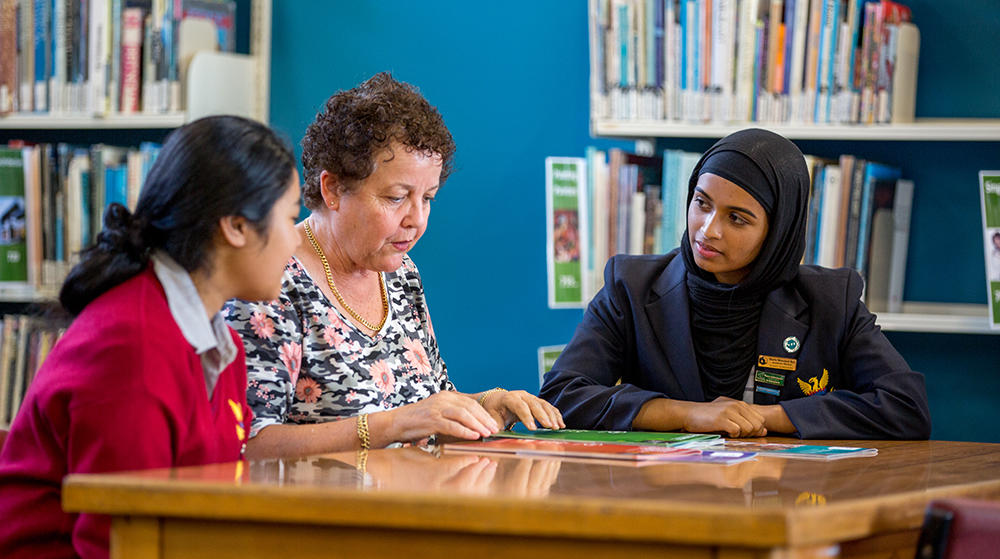Mount Roskill Grammar School Students consider many of the options below when they are thinking of what to do when they leave high school. It is interesting to note, however, that each year around 90% of Mount Roskill Grammar School students go into some type of tertiary education, at either a university, institute of technology or a P.T.E. when they leave school.

Universities
Universities emphasise independent thinking and research. They usually offer the highest level of tertiary qualifications. A large number of Mount Roskill Grammar School students choose to go on to university study. On the websites below you can search for the programmes the universities offer, their entry requirements, and the school subjects required or recommended for your course.
Studying In Universities Overseas
Studying In Universities in Australia
Here is some information from NZQA about applying to Australian universities: http://www.nzqa.govt.nz/qualifications-standards/awards/university-entrance/entrance-to-australian-universities/
Which Australian university should I choose?
A good place to start is to look at the Group of Eight which are the highest ranked universities in Australia.
These are:
- Australia National University
- University of Sydney
- University of New South Wales
- Monash University
- University of Melbourne
- University of Adelaide
- University of Western Australia
- University of Queensland
Most Australian university courses require NCEA Level 3 English and Mathematics, usually Calculus, as well as any other specific subject requirements. If you are intending to study medicine at an Australian university after Year 13, you must complete the UMAT test during Year 13.
Students wanting to apply to an Australian University need to get organised early because applications close much earlier than in New Zealand, with the first closing as early as July. Please check the websites of your universities of choice to find the open for enrolment dates.
Studying in the United States of America
The links below provide some of the vital information about studying in the United States as well as some useful contacts.
Studying in the United Kingdom
The links below provide some vital information about studying in the United Kingdom. For more information check out the websites of the universities you are interested in.
Institutes of Technology and Wananga
Some students study at Unitec, MIT or Wananga. These Auckland-based tertiary institutions offer degrees and post-graduate study, but their qualifications are often based on a more practical, hands-on approach.
They also offer a large number of pre-degree certificates and diplomas which can be used as work-based qualifications in their own right, or as foundation studies for students wishing to ultimately study at degree level.
Check out their websites below for course entry requirements and career opportunities:
Private Training Establishments (P.T.Es)
Private Training Establishments are tertiary institutions registered and accredited with the New Zealand Qualifications Authority (NZQA). They offer mainly certificates and diplomas which are NZQA approved and which provide students with specific knowledge and skills needed for the workplace. Many of these specialise in subjects like business, travel and tourism, hairdressing, computer training and cooking.
When checking these out, make sure the P.T.E. is NZQA accredited and that the course you are intending to study is NZQA approved. If the P.T.E. is classified as a Category 1 provider, it means it has had the best external evaluations and reviews by NZQA. If you are unsure, ask Miss Hodge in H4 to clarify whether the P.T.E. is NZQA accredited.
Some Private Training Establishments Popular With MRGS Students:
- Music & Audio Institute of NZ (MAINZ)
- SAE Institute – Auckland (Audio Engineering)
- Animation College/Yoobee Colleges
- Cut Above (Hair Styling)
- New Zealand School of Tourism
- International Travel College
- Crown Institute of Studies (Business, Hospitality, Travel & Tourism)
- Yoobee School of Design/Youbee Colleges
- Techtorium NZ Institute of Information Technology
- Media Design School/Yoobee Colleges
Trades and Apprenticeships
To get into a trade you need to complete a New Zealand apprenticeship. This involves working as a trainee tradesperson in the workplace with an employer who trains you and organises for you to complete the unit standards required. Apprenticeships usually take three to four years and you will be earning at the same time. This link helps you to learn more about industry and trade training (apprenticeships).
Industry Training Organisations (ITOs) design your apprenticeship training programme and can sometimes have a database of employers who are wanting apprentices. You can contact the ITOs to talk about the type of apprenticeships available. Please be aware that some ITOs are much more supportive than others in helping school leavers to find apprenticeships. The following link gives you contact details for the ITOs. https://www.nzqa.govt.nz/audience-pages/ssbs/
You will have a better chance of being considered for an apprenticeship, if you are willing to work hard and have at least a restricted driver’s licence.
If you cannot get an apprenticeship and still want to have a career in the trades, Unitec and MIT offer usually one year pre-apprenticeship courses. See Miss Hodge in H4 for more information.
The Defence Forces
Police – Check out the variety of jobs available and the recruitment process for the New Zealand Police on the following website: www.newcops.co.nz However, before you can apply for the Police, you must have your full driver’s licence.
The New Zealand Defence Forces, Army, Navy and Airforce, offer a wide range of well-paid careers. They provide paid training for you to become qualified in many of the trades and this is an excellent alternative to an apprenticeship. There are also many other professional careers available in the Defence Forces. Check out the information below.
https://www.defencecareers.mil.nz/army/
Fees Free Education
The government has brought in a new law that gives many students their first year of study free. The intention is that by 2024 New Zealanders will be entitled to three years of fees free education. Check out whether you qualify. www.feesfree.govt.nz
Remember to check out the next section on Scholarships, as there may be scholarships available that you may qualify for.
Work
A number of Mount Roskill Grammar School students go straight into full time work after leaving school. Because entry-level full time jobs are often difficult to find, family members and friends have often assisted our students in finding and obtaining these jobs.
In addition to using your networks as above, this job hunting link on the CareersNZ website https://www.careers.govt.nz/job-hunting provides detailed information on how to find work, how to write CVs and cover letters, tips for interviews and what to do if you do not get the job. You can also see Miss Hodge in H4 for help with this.
CareersNZ also offers a Job Hunter’s ebook that can be downloaded from the following link:
https://www.careers.govt.nz/job-hunting/finding-work/job-hunters-ebook/
Gap Year
A lot of young people take a gap year – or more – before further study. Some are simply tired of studying; others don’t know what they want to do as a career. Many young people don’t want to commit to a course until they find something that really interests them, so they prefer to take a gap year.
Check out the information below on taking a gap year from the CareersNZ website:
https://www.careers.govt.nz/articles/my-daughter-needs-to-plan-her-gap-year/

